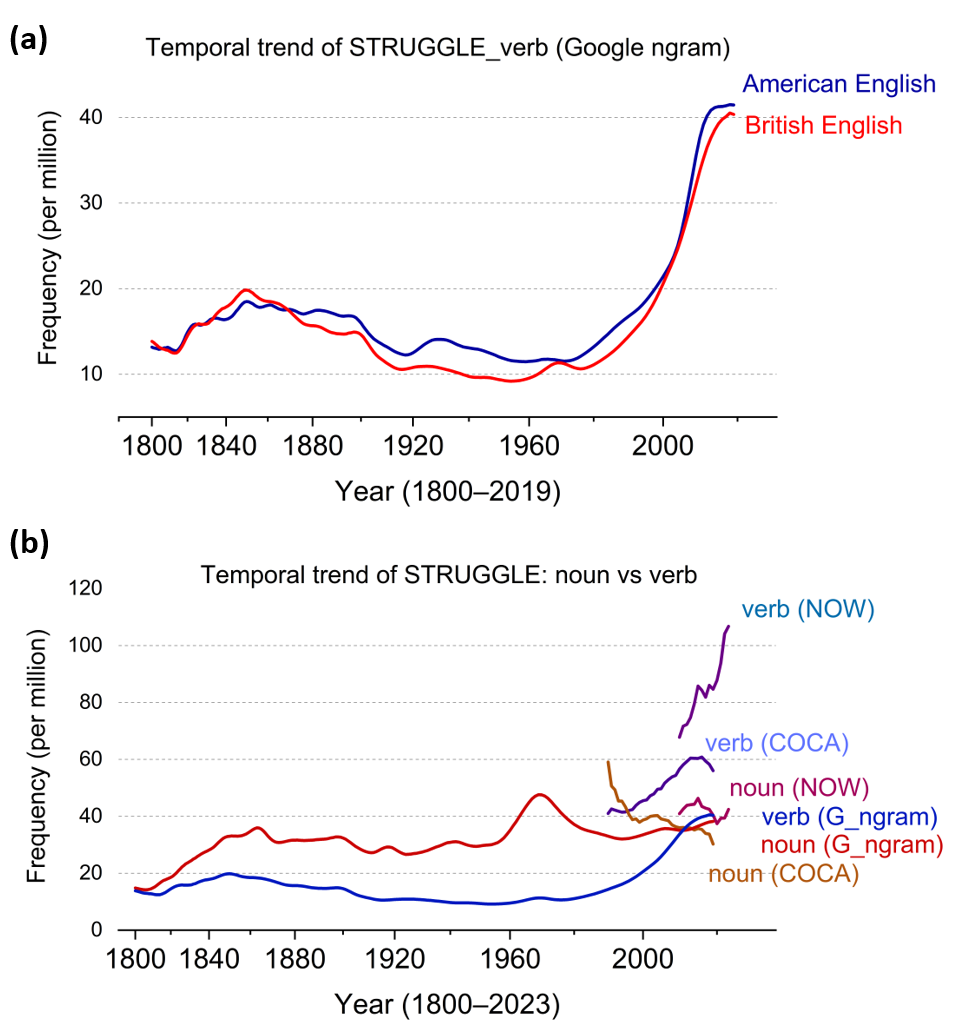Decoding “struggle” — my observations
A word I found very frequently in student emails is struggle. Instead of employing alternative expressions like be stuck, have a hard time, have trouble, or have difficulty, they consistently lean towards using struggle. This linguistic divergence presents a cultural contrast for me after relocating to the UK, as I tend to associate struggle with more serious connotations
This observation prompted me to reflect, and I realized it might largely be a regional word preference. A cursory exploration of the verb forms of struggle in The Corpus of Global Web-Based English (GloWbE) confirms not only a higher frequency of use but also a markedly greater overall occurrence of this word in GB compared to any other country in the database (Figure 1).

Figure 1. Comparison of the word STRUGGLE used in various countries. In each box, the upper number is the occurrence, and the lower number is the frequency in per million. Data retrieved from GloWbE through www.english-corpora.org.
Yet, delving into the historical trajectory of this term reveals a notable surge in popularity around the year 2000 in both British and American books, according to the Google Books Ngram Viewer (Figure 2a). The nearly identical trends observed here may suggest a universal phenomenon across most English-speaking countries. Intriguingly, examining the noun and verb forms of struggle shows distinct patterns (Figure 2b). The noun usage gained traction as early as 1840, consistently surpassing that of the verb form for over a century.
Curiously, around 2000, the verb form began to be employed frequently to signify “making strenuous or violent efforts in the face of difficulties or opposition” or “proceeding with difficulty or great effort,” according to Merriam-Webster. The rapid growth in the usage of the verb form is noteworthy, surpassing the noun form in frequency after 2010. In fact, there appears to be a recent decreasing trend in the use of struggle as a noun.
Since the Google Books Ngram Viewer only provides data up to 2019, a comparison using other text corpora, such as NOW (News on the Web, 2010–present) and COCA (Corpus of Contemporary American English, 1990–2019), has been included to depict the evolving trends in usage. I should note that the scale of the year axis is not linear, allowing for a clearer representation of trends in recent years.

Figure 2. (a) Comparison of the trend of STRUGGLE used as a verb in British and American English. Data retrieved from Books Ngram Viewer (books.google.com/ngrams). (b) The trend of STRUGGLE used retrieved from Books Ngram Viewer, COCA, and NOW corpora through www.english-corpora.org.
The question arises: What caused the rapidly increased use of struggle as a verb? At this stage, I do not want to make any suggestions but simply want to share this observation. How would you interpret this data? Does it suggest that life has become more difficult than it was 20 years ago? While I hesitate to draw such conclusions, I sincerely hope that the current upward trend in the use of struggle will subside in the near future.